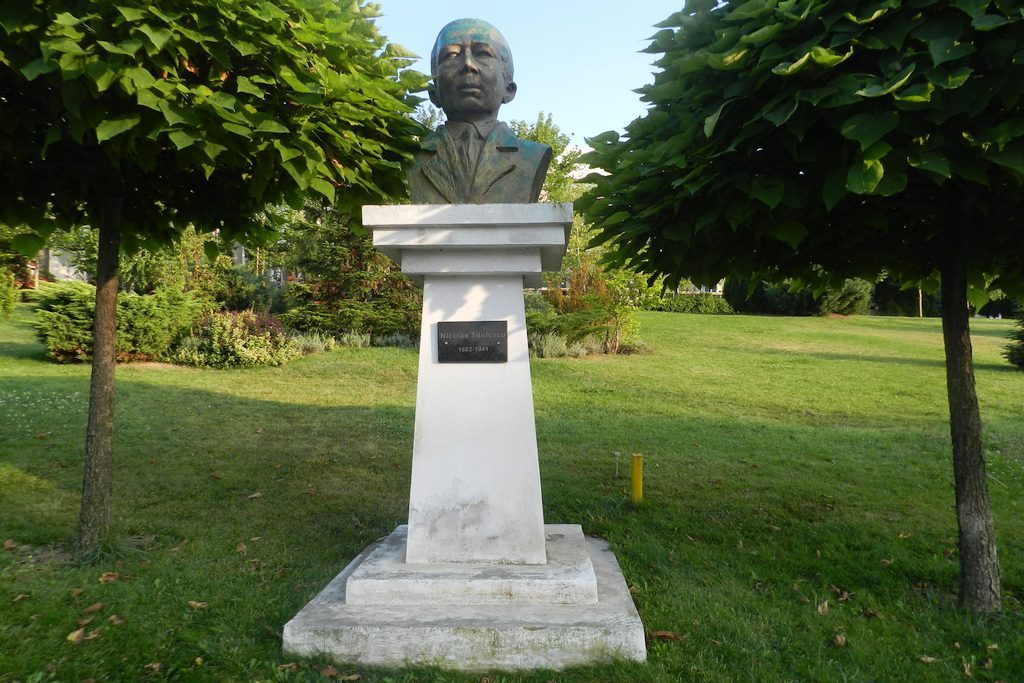

Titulescu statue was inaugurated in 2012 with the occasion of celebrating the130th anniversary since the birth of the great Romanian diplomat.
Nicolae Titulescu (born March 4, 1882 in Craiova – died on March 17, 1941 in Cannes) was a romanian diplomat, lawyer, professor and politician, was,on several occasions Minister of Foreign Affairs, plenipotentiary minister, former president of the League of Nations. He was a former titular member (1935) of the Romanian Academy.Born in Craiova the son of a lawyer, he spent his childhood at the estate of his father, Ion Titulescu in Tituleşti, Olt. Ion Titulescu was a descendant of a family of small landowners, the son of Archpriest Nicolae Economu. He served as prefect of the Dolj county , president of the High Court, deputy in Parliament under the government of Ion Brătianu. Between 1893-1900 he attended the courses of the high school “Carol I” in Craiova. Based on the excellent results obtained (honorary award at the baccalaureate exam) receives a scholarship in Paris and for 5 years will attend the courses of Faculty of Law. In 1903 he was awarded the prize “Ernest Beaumont” in a competition organized in all Faculties of Law in France. In Paris he obtains his doctorate with the dissertation “Essai sur une théorie des droits éventuels”. In this period he is initiated into Freemasonry in a Masonic lodge in the French capital. In 1905 he returned to Romania as a law professor at the University of Iaşi, and in 1907 moved to Bucharest. Nicolae Titulescu joins the politics in 1909 and in 1912 earns a place on the list of Conservative Democratic Party led by Take Ionescu, becoming deputy Romanați. Five years later he became a member of the government of Ion I. C. Brătianu as Minister of Finance.
In the summer of 1918, together with other Romanian personalities (Take Ionescu, Octavian Goga, Traian Vuia, Constantin Mille) founds in Paris, Romanian National Committee, with the purpose of promoting within the international public opinion,the romanians people’s right to national unity. In the years 1928 – 1936, Nicolae Titulescu was several times Minister of Foreign Affairs. Beginning with the year 1921 he worked as the permanent representative of Romania to the League of Nations in Geneva, being elected twice (1930 and 1931) President of this international organization. From this position he fought against the revisionism from Europe, for keeping the borders as they were established through the treaties of peace, for good neighborly relations between larger states and small ones, for respecting the sovereignty and equality of all states in international relations, for collective security and the prevention of bullying. In 1936, King Charles II, aligning himself to the pressures of circlesof the right (pro-Nazi) Legionnaire but foreign also, removes him from all official functions and forces him into exile. Established at first in Switzerland, then in France, Nicolae Titulescu propagated even in exile, through conferences and newspaper articles, the idea of preserving peace, anticipating the danger of a new war. Nicolae Titulescu dies at Cannes (or Soubrettes, Switzerland, after Petre Pandrea) after a long suffering, on March 17, 1941. An analysis of his diplomatic thought is made by Nicolae Titulescu himself: “The entire external policy that we followed … had only this goal: not to prepare the war, but to prepare a network of alliances so that the war to become impossible “.
